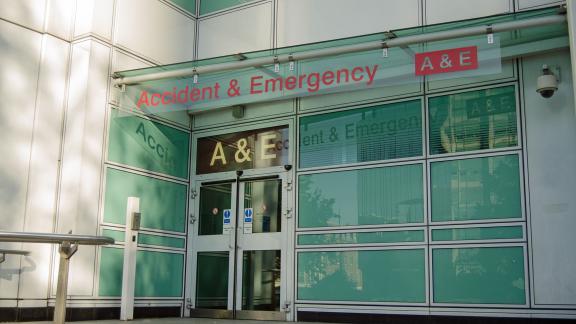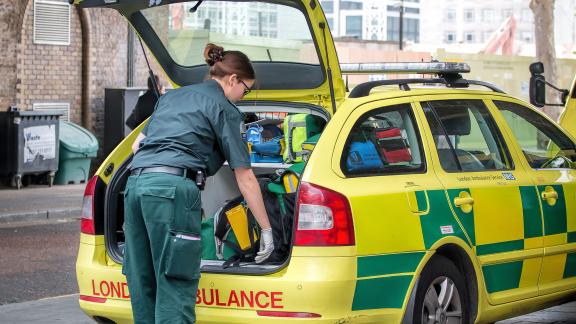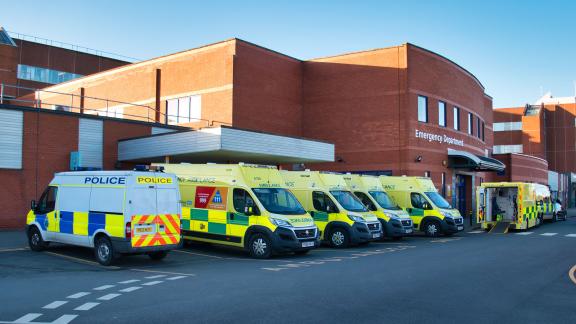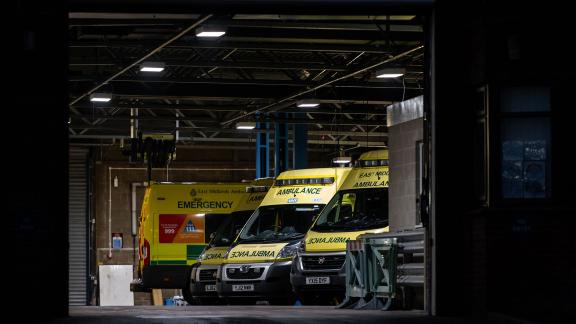Frankly, we’re making a drama out of an A&E ‘crisis’

There is nothing extraordinary, unprecedented or even unexpected about the ‘crisis’ we have allowed to envelop us, writes Darren Kilroy, lead clinician at East Cheshire NHS Trust. What is extraordinary, he argues, is how it has been described back to us in words and actions. "In that, we have all been complicit."
“Crisis [noun]: a time of intense difficulty or danger; a time when a difficult or important decision must be made; the turning point. From the Greek krisis: decision; krinein: decide”.
A&E crises appear out of nowhere and take you by surprise. They consume all available newsprint, gobble up television bulletins and wade into every conversation. They rattle the telephones of every trust communications team, knock on the door of the chief executive and wait expectantly for that next not-quite-met target.
They bide their time. They watch and wait.
And then, they pounce, decisively and aggressively, forcing the ill-prepared healthcare system into a delirious and chaotic whirlpool of escalation which ends in root-cause analyses and mountains of filed-away paperwork.
And yet – and yet – there is nothing extraordinary, unprecedented nor even unexpected about the ‘crisis’ we have allowed to envelop us.
We have not suddenly received plane-loads of frail elderly people at our airports; these people have been steadily ageing – like all of us – since the day we were born. The temperature has fallen in recent weeks, but it has fallen every year at about this time for just over 12,000 years – A&E units actually tend to see more patients in the summer in any case.
What is extraordinary about our current national situation is how it has been described back to us in words and actions. In that, we have all been complicit.
Take the issue of ‘inappropriate’ A&E patients. It’s much talked about: most health economies will have a sense of how many patients attend A&E but who should have ‘sought help elsewhere’. These are the people labelled as ‘inappropriate’. We wring our hands about the solution. Tell them to choose well. Tell them to see a pharmacist, visit their GP, call a number, look on a website. But how does an elderly patient with a bad cough make that judgment? How do they choose ‘well’? How do they ensure their health-seeking behaviours will be judged ‘appropriate’?
They cannot, of course.
The judgment is made by others, as each patient aggregates into the statistic. Every ‘inappropriate’ patient has a story to tell, an anxiety to relieve, a worry to resolve. For many patients, it isn’t a matter of choosing well. It’s the fact that they really don’t want to choose at all. They just want help.
Then we have a commentary on ‘reducing demand.’
In the course of our daily lives, none of us conspire to place ‘demand’ on the NHS. We may seek help often; we may seek help from many. And in so doing, we have added to ‘demand’. But that seeking of help tells a story about our lives and our care. To ‘reduce’ that demand, we need to listen hard to those stories and think hard about that care.
Much of the demand ‘reduction’ rhetoric is couched in terms of self-care. History does not bode well for that being the solution – at least not any time soon. Much of what is said in the name of ‘reducing’ demand actually reflects a desire to re-provide its management. Less A&E, more GP. Less GP, more pharmacy. Less pharmacy, more self-help.
So it goes on.
What the discourse often overlooks is that, in re-providing that management, the need for resources is – if anything – increased, not lessened. Packages of community care for the frail elderly, so desperately needed to ‘reduce demand’ on hospitals, are labour-intensive, time-consuming and complicated. Effective mental health provision to ‘reduce demand’ on A&E crisis teams is skilled, needs incredible vigilance and tenacity. Demand reduced here means increased resources there.
Then, we debate the roles of ‘primary care’, ‘secondary care’ and ‘community care’ in enabling ‘integrated care’. And these are not new debates. But neither are the words, which may well be why things are still as they are. Everybody has their own idea about what these words mean; nobody knows if my idea fits yours.
We knock the square peg of traditional roles into the round hole of 21st century unplanned care and are surprised to find it doesn’t fit. We can’t change the shape of the hole but we can change the shape of the peg. It’s unclear how honest we are actually being about that in terms of the true re-interpretation of 1948-style professional identities.
So what do we find before us?
- Inappropriate patients who are actually totally appropriate but facing an inappropriate system: one that is too unwieldy, too inconsistent and too fragmented.
- People asked to choose their entry point into unplanned care because we have chosen to make it unfathomable.
- Demand which will not reduce but instead needs well-resourced and simplified capacity to meet it.
- Traditional professions needling about who does what at the margins when we really need to hold a mirror to ourselves and be honest about the kinds of practitioners our country needs.
Small wonder, then, that the commentary becomes one of ‘crisis’. We have been complicit in its creation. We throw around any number of words and phrases in healthcare and each one carries a legacy of behaviours, attitudes and assumptions. Great work is going on to get us where we need to be in healthcare reform. But great work has been going on for decades.
This is the end-game for outdated approaches to care. Let’s think more about inappropriate labels, not patients. Let’s reduce the complexity of supply, not demand. Let’s describe a workforce of ‘care’ without bogging it down with a location.
Only by taking these vital actions will we move beyond ‘crisis’ – which, as the dictionary tells us, does mean to decide.
Dr Darren Kilroy is lead clinician for emergency care at East Cheshire NHS Trust, an integrated care organisation. Follow them on Twitter @DrDKilroy @EastCheshireNHS
Like this post?
Share it on Twitter.



